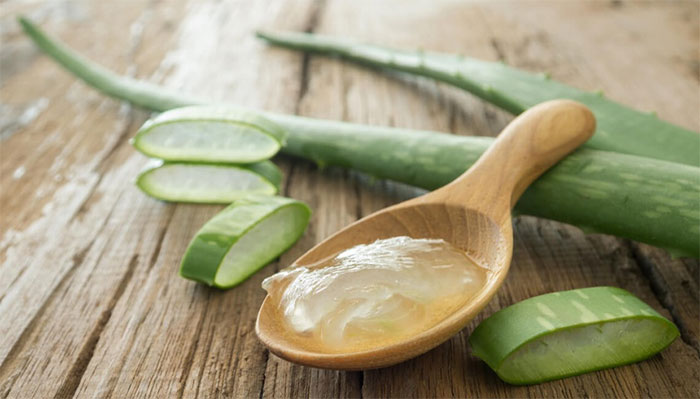Aloe Vera – in Vietnamese it is called Aloe Vera, Long Tu or Nha Dam. Aloe Vera plant belongs to yang, welded, slightly bitter, non-toxic. People often use this herb to treat burns, skin sores, and freckles.
Aloe vera is easy to grow and is used regularly in everyday life. Medicinally, aloe vera has been used in healing for thousands of years.
Healing effects of aloe vera
Aloe vera has 2 main effects. When used in small doses (0.05-0.1 g), aloe vera acts as a tonic, stimulates digestion and laxative, anti-inflammatory bowel disease, constipation. This plant contains a variety of digestive enzymes and active groups of emodin and aloin which have a laxative effect.
In the case of high doses, aloe vera will be a powerful but slow-acting bleach after 10 to 15 hours. It causes congestion of the abdominal organs, especially the large intestine. Therefore, people with hemorrhoids and pregnant women are not used.
Meanwhile, according to traditional medicine, aloe vera has a bitter taste, welding properties, in 4 channels, spleen, taste and colon. It has an antiseptic, laxative, warm and conscientious effect. Aloe vera is a good treatment for citrus diseases, amenorrhea, and constipation in children.
Plus, aloe vera also works to inhibit pain. Thus, aloe vera is also extracted as a gel to be applied to the injured areas, helping to reduce inflammation and pain.
In addition, aloe vera has a series of good uses such as inhibiting histamine reactions and helping to quickly relieve allergies, heal wounds and purify keratinocytes on the skin, antibacterial, antifungal; Helps to regenerate cells, remove old cells, regenerate new tissue, detoxify the body by improving metabolism in liver and kidneys to help remove toxins.
Along with these effects, aloe vera is formulated in many other products for use in everyday life. In the field of cosmetic chemistry, aloe vera is formulated as a cream to help moisturize and nourish the skin through the use of cell regeneration, wound healing and acne treatment.
The two main ingredients of aloe vera are lignin and the polysaccharide which penetrates deep into the epidermis, cleansing bacteria and oils clogging the pores.
In the medical field, aloe vera is formulated as a skin gel in surgery to heal incisions and prevent radiation. The University of Oklahoma (USA) has prepared toothpaste, aloe vera extract to prevent bleeding and gingivitis, prevent tooth decay and strengthen teeth.
Is using aloe vera harmful or not?
Pure aloe vera resin is poisonous. It can lead to diarrhea. Babies can become deformed if the mother is poisoned during pregnancy. If used in large amounts, aloe vera can cause abdominal cramps, vomiting, diarrhea, and excretion in the urine, making the urine colored like blood.

If used in too high a dose (around 8g), aloe vera can cause fatal poisoning. Symptoms are heavy stools, general weakness, slow heartbeat, decrease in body temperature.
Breastfeeding women should use aloe vera with caution as babies can be poisoned while breastfeeding. People with hemorrhoids inflammatory bowel disease should not be used as the anthraquinone in aloe resin can cause congestion. People who have cold or cold, diarrhea and low blood pressure are not allowed.
Because aloe vera is an easy plant to grow and to live well in environments, many families often grow it at home for convenience. However, since aloe vera resin is poisonous, users should be careful to treat it with care.
Before eating, aloe vera should be cleaned of the yellow pus alongside the jelly to prevent poisoning. Users need to peel, wash, cut, eat with yogurt, cook with green beans. This is also for long-term use at low doses.
You don’t apply aloe vera directly to the skin because it causes irritation, redness, and inflammation. Many cases of allergies are caused by using aloe vera leaves without peeling the skin.
Plus, you shouldn’t overdo aloe for steeping. It can cause heart rhythm disturbances if taken for a long time. However, aloe vera juice is a cool and mild laxative, but not as sweet and safe as ginseng mist, jelly …
Aloe vera gel is widely sold in supermarkets and touted as a panacea. However, people with heart disease avoid using it due to the risk of arrhythmia.


